Complete Solutions to EXERCISE-II (H.W) of chapter UNITS AND MEASUREMENTS of Class 11 book with complete answers and questions
| Class 11 | PHYSICS |
| Chapter | UNITS AND MEASUREMENTS |
| NARAYANA | EXERCISE-II (H.W) |
| Number Of Questions | 28 |
| Academic Year | 2023-24 |
The error in the measurement fo length of a simple pendulum is `0.1%` and error in the time period is `2%`. The possible maximum error in the quantity having dimensional formula `LT^(2)` is
View SolutionThe length of a cyclinder is measured as 5 cm using a vernier calipers of least count 0.1 mm. The percentage error in the measured length is nearly
View SolutionThe diameter of a wire as measured by a screw gauge was found to be `1.002cm, 1.000cm` and `1.006cm`. The absolute error in the first reading.
View SolutionNumber of particles is given by `n=-D(n_(2)-n_(1))/(x_(2)-x_(1))` crossing a unit area perpendicular to `X`-axis in unit time, where `n_(1)` and `n_(2)` are number of particles per unit volume for the value of `x` meant to `x_(2)` and `x_(1)`. Find dimensions of `D` called as diffusion constant
View SolutionThe external and internal diameter of a hollow cylinder are determined with vernier calipers and the results are recorded as `(4.23 +- 0.001)cm` and `(3.89 +- 0.01)cm`. The thickness of the cyclinder wall within the limits of error is
View SolutionThe density of a cube is measured by measuring its mass and the length of its sides. If the maximum errors in the measurement of mass and length are `3% and 2%`, respectively, then find the maximum error in the measurement of the density of cube.
View SolutionThe diameter of a sphere is `3.34 m`. Calculate its volume with due regard to significant figures.
View SolutionThe length , breath and thickness of a metal sheet are `4.234m, 1.005m`, and `2.01cm` respectively then the volume of the sheet is
View SolutionThe sides of a rectangle are `(10.5 +- 0.2) cm and ( 5.2 +- 0.1 ) cm`. Calculate its perimeter with error limits .
View SolutionIf the ratio of fundamental units in two systems are `2:3` the ratio of force in these two systems is
View SolutionIf `L, R , C , and V`, respectively , represent inductance , resistance , capacitance and potential difference , then the dimensions of `L //RCV` are the same as those of
View SolutionHydrostatic pressure 'P' varies with displacement 'x' as `P = (A)/(B)log(Bx^(2) +C)` where A,B, and C are constants. The dimensional formula for 'A' is
View SolutionThe units of force, velocity and energy are `100 "dyne", 10 cm s^(-1)` and `500erg` respectively. The units of mass, length and time are
View SolutionThe ratio of `SI` unit to `CGS` unti of gravitational constant of
View SolutionThe frequency `f` of vibrations of a mass `m` suspended from a spring of spring constant `k` is given by `f = Cm^(x) k^(y)` , where `C` is a dimensionnless constant. The values of `x and y` are, respectively,
View SolutionIf the period `'T'` of a drop under surface tension `'s'` is given by `T = sqrt(d^(a) r^(b) S^(c))` where `d` is the density , `r` is the radius of the drop. If `a=1,c= -1` then the value of `b` is
View SolutionIf the velocity `(V)` , acceleration `(A)` , and force `(F)` are taken as fundamental quantities instead of mass `(M)` , length `(L) , and time (T)` , the dimensions of young's modulus `(Y)` would be
View SolutionThe time dependence of a physical quantity `P` is given by `P = P_(0)e^(-alpha t^(2))` , where `alpha` is a constant and `t` is time . Then constant `alpha` is//has
View SolutionThe value fo `x` in the formula `Y = (2mg l^(x))/(5bt^(3)e)` where `m` is the mass, `'g'` is acceleration due to gravity, `l` is length , `'b'` is the breath, `'t'` is the thickness and `e` is the extension and `Y` is Young's Modulus is
View SolutionThe velocity of sound in air `(V)` pressure `(P)` and density of air `(d)` are related as `V alpha p^(x) d^(y)`. The values of `x` and `y` respectively are
View Solution
View SolutionThere are four scales, whose specification are given in column -I and the least count is given in column -II (S=value of main scale division , n= number of marks on vernier )
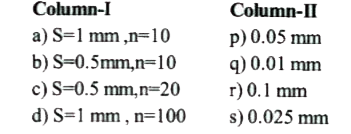
View SolutionUsing signification figures, match the following
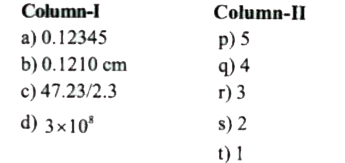
View SolutionMatch List I with List II and select the correct answer using the codes given below the Lists.
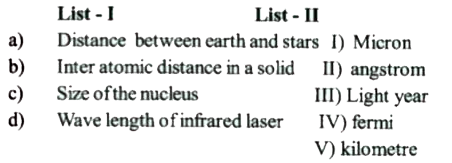
View SolutionSome physical constants are given in List -I and their dimensional formulae are given in List-2. Match the following
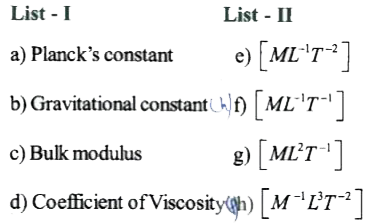
View SolutionNames of units of some physical quantities are given in List-I and their dimensional formulae are given in List-II . Match the correct pair of the lists.
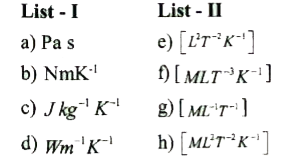
View SolutionMatch List I with List II and select the correct answer using the codes given below the Lists.
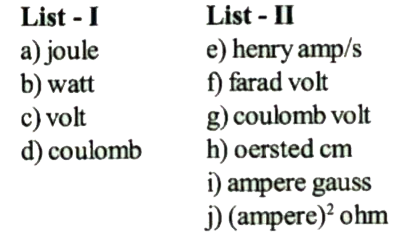
View SolutionMatch List I with List II and select the correct answer using the codes given below the Lists.
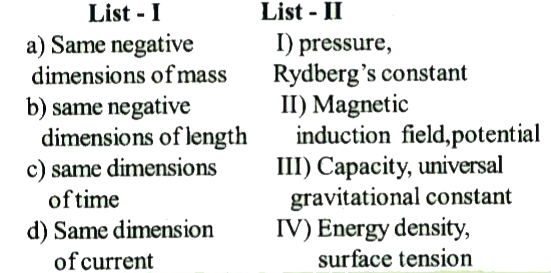
View Solution
EXERCISE-II (H.W) questions and complete solutions for chapter UNITS AND MEASUREMENTS of NARAYANA PHYSICS (HINGLISH) of Class 11
All Exercises from NARAYANA Class 11 PHYSICS UNITS AND MEASUREMENTS
- C.U.Q
- C.U.Q -ADDITIONAL QUESTIONS
- EVALUATE YOURSELF - 1
- EVALUATE YOURSELF - 2
- EVALUATE YOURSELF - 3
- EVALUATE YOURSELF - 4
- Examples
- EXERCISE -I (C.W)
- EXERCISE -I (H.W)
- EXERCISE -II (C.W)
- EXERCISE-II (H.W)
- EXERCISE-III
- EXERCISE-IV
- ILLUSTRATION
- ILLUSTRATIONS
- LEVEL-I (C.W)
- LEVEL-I (H.W)
- LEVEL-II (C.W)
- LEVEL-II (H.W)
- LEVEL-III
- More than One Answer Questions
- NCERT EXEMPLAR QUESTIONS
- Single Option Questions
- STATEMENT TYPE QUESTION